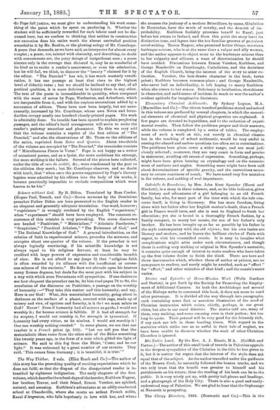The Way Thither. 2 vols. (Eliot Stock and. Co.)—The author
of this story has the provoking quality of exciting expectations which he does not falfil, so that the disgust of the disappointed reader is in- tensified by righteous indignation. The early chapters of the first volume, which describe the school-days of the heroine, Kathleen Nugent, her brother, Trevor, and their friend, Ernest Vereker, are spirited, natural, and amusing. Kathleen's adventures at an oddly-conducted school at Chaudevfile, where she meets an ardent French noble, Raoul d'Argenton, who falls hopelessly in love with her, and where she arouses the jealousy of a modern Brinvilliers, by name, GISneviJve de Hautenbas, have the merit of novelty, and the demerit of im- probability. Kathleen foolishly promises herself to Raoul, just before her return to Ireland, and from this point the story lose.; its distinctive tone, and lapses into the too familiar grooves of prevalent novel-writing. Trevor Nugent, who promised better things, marries a burlesque actress, who is at the same time a vulgar and silly woman, and the author appears to object more to the burlesque actress than to her vulgarity and silliness, a want of discrimination he should have avoided. Discussions between Ernest Vereker, Kathleen, and George Mandeville on Freethought, Catholicism, and the doctrines of the English Church, bring the interest of the story to utter ex- tinction. Vereker, the best-drawn character in the book, turns priest ; Kathleen becomes common-place ; and George Mandeville, who never had an individuality, is left hoping to marry Kathleen when she comes to her senses. Deficiency in localisation, sketchiness in character, and suddenness of incident do much to mar the author's evident aptitude for imaginative literature.


































 Previous page
Previous page